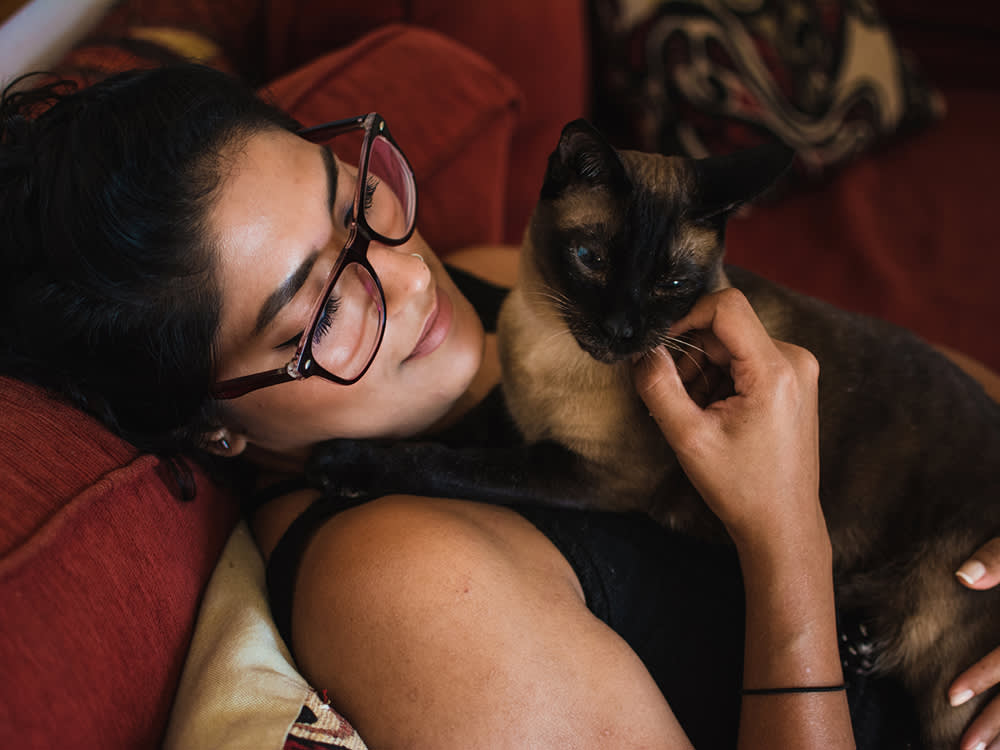A Cat Could Be Your New On-Campus Counselor
A new study finds that the presence of cats on college campuses helps calm students who could really use some chill time.

share article
When it comes to therapy animals, dogs easily get the best press. There’s plenty of researchopens in a new tab that finds spending time with dogsopens in a new tab does wonders for reducing both stress and physical painopens in a new tab. But for all the time spent gathering evidence to support the effectiveness of some one-on-one canine-human time, there has been remarkably little research on cats as therapeutic animals. A new studyopens in a new tab published in Anthrozöös aims to close that gap by studying the effects of cats on student stress.
Animal Assisted Interventions On College Campuses
Animal-assisted interventions (AAIs) have soared in popularity in recent years — especially on college campuses, where they’re often used during exam periods. Previous studies have shownopens in a new tab that AAIs have positive effects on study skills, mood and emotion, cortisol levels, and perceived stress; that’s great news for students from all walks of life. But 86 percent of those AAIs featured only dogs. Researchers already know that petting a cat improves mood, and living with a cat decreases depression, so it’s kind of weird that cats are so often excluded from the AAI conversation.
The researchers behind University Cats? Predictors of Staff and Student Responsiveness Toward On-Campus Cat Visitationsopens in a new tab guessed that this might be for a few reasons. One is that dogs are typically seen as easier to train and more predictable than cats, so universities assume there’s less liability associated with them. Another is that people aren’t as familiar with what an unhappy or agitated cat opens in a new tablooks like, so it would be necessary to educate students on how to understand cat body language before putting them in a room together. But researchers suggest that cats aren’t viewed as therapeutic animals because of negative stereotypes depicting cats as aloof, aggressive, and more allergenic than dogs.
The Study
Before participating, students were surveyed to find out their demographic characteristics (age, employee or student status, and gender) and their emotionality, perceived stress, prior animal ownership, cat allergies and phobias, and perceived risk of on-campus cats. On the topic of emotionality — a person’s emotional reactivity to stimulus, as opposed to emotional stability — participants ranked themselves on the following statements: “I see myself as someone who worries a lot,” “I see myself as someone who gets nervous easily,” “I see myself as someone who is depressed, blue,” and “I see myself as someone who remains calm in tense situations.”
Researchers expected perceived stress — the feelings students have about their own stress levels — to be a strong predictor of how useful the cat interventions would be, but the correlation ended up being insignificant. Instead, the strongest predictor of a positive AAI response was emotionality. For highly emotional students, the presence of a cat greatly increased happiness. Demographics made a difference, too; according to the study, “female respondents, students, cat owners, and dog owners showed higher responsiveness compared with male respondents, employees, non-cat owners, and non-dog owners.”
The data doesn’t lie: Cats and dogs both deserve a positive reputation for their calming effects on humans. Everyone experiences stress in different ways, so — though more research is needed to confirm — it could be a game-changer to introduce more cat friends to people with particularly high emotionality. Who knows — maybe the future of higher education looks a little more like a zoo than a campus (at least around finals week).

Sio Hornbuckle
Sio Hornbuckle is a writer living in New York City with their cat, Toni Collette.
Related articles
![Woman's hand holding a dog looking out of the window of a car driving down a desert road]() opens in a new tab
opens in a new tab78 Percent of People Use Their Pet to Get Out of Plans
That and other surprising (unsurprising?) results from The Wildest’s 2022 pet parenting trends survey.
- opens in a new tab
Does Your Dog Have Therapy Dog Potential?
Renowned animal behaviorist Patricia McConnell, PhD, on what it takes to be a great therapy dog.
![A woman sitting on a couch with a dog.]() opens in a new tab
opens in a new tabDoes Your Pet Need Therapy?
Dogs and cats can’t read self-help books, so a veterinary behaviorist explains how your pet may benefit from being in treatment.




